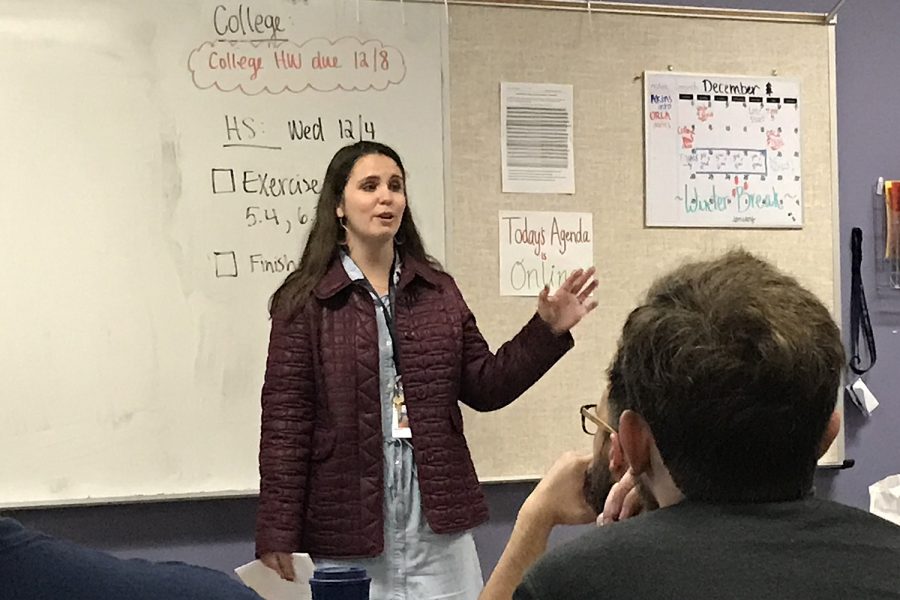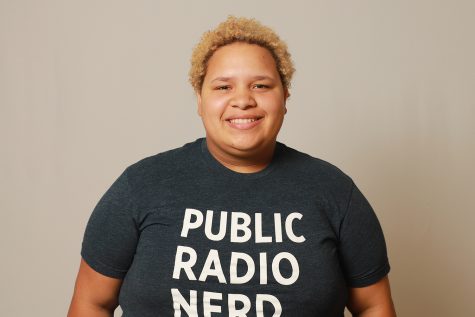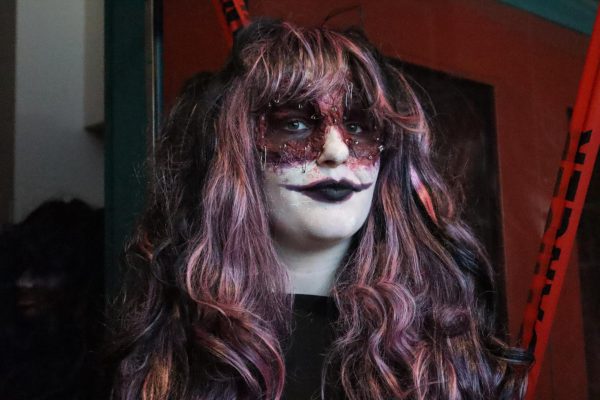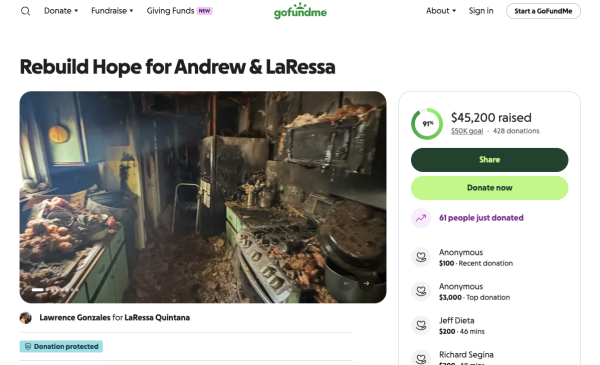SSS offers unique services to address student needs
School social worker Meg Scamardo speaks with teachers in the New Tech Academy about the services that the Student Support Services office provides. The SSS sees hundreds of students each year in need of counseling, financial support and other services.
November 21, 2019
For more than 10 years, Akins’ Student Support Services program has served thousands of students in need of counseling services.
It’s a program that is unique to Akins and originated in 2006 from an identified need for mental health and financial support services to students. At the time campus administrators applied for a grant that funded the program for two years.
When the funding for the grant ran out in 2008, campus administration saw the benefits that having a social worker on staff provided. Principal Daniel Girard then decided to fund the program out of campus discretionary funds to ensure that the SSS was able to continue to provide services to students.
Colleen Arnold served at the campus social worker and head of the SSS for 10 years before Meg Scamardo took over as the head of the program in 2018. The counseling program Akins others is different than that of many of the others offered at Austin ISD high schools because all services are free, voluntary and confidential.
“I don’t think that there’s ever too much mental health support that we can provide at schools and provide to students,” Scamardo said.
Besides one-on-one counseling services the SSS also provides support group meetings during FIT that focus on specific topics. It also assists students who lack stable housing.
“During FIT, there are group meetings that range form LGBTQ, anger management, girl empowerment, pregnancy,” Scamardo said.
At other Austin ISD high schools, mental health counseling services are largely provided through an outside contractor called Vida Clinic.
Vida Clinic is a mental health agency in Austin specializing in school mental health. Vida’s goal is to use clinical assessment instruments collaboratively with clients as tools for creating a healing experience and helping clients to know themselves better. Vida Clinic provides services at more than 40 Austin ISD schools today, ranging from elementary to middle to high schools.
A recent Washington Post article described the services provided by Vida Clinic in Austin ISD, focusing specifically on Crockett High School, where the partnership began. At these other campuses, therapists have their offices within schools, where they treat students directly rather than assessing and referring them elsewhere.
“Even just as awareness about mental health grows, it requires more support, I think Vida Clinic and school-based mental health centers are amazing,” Scamardo said.
The goal of introducing school-based mental health centers to Austin schools was to prove that by having therapists on campus they could provide accessible, trauma-informed mental health care that can significantly aid students struggling with depression, anxiety, and other trauma-induced conditions.
In late 2017, Austin ISD secured $4.5 million of state funding through the Victim of Crimes Act to open Vida Clinics at 22 elementary schools in some of Austin’s highest crime areas.
District officials believed that children living in high-risk areas are more likely to be exposed to traumatic events and that their schools need to responsive in meeting their mental health needs.
Many schools’ mental health professionals typically do not have the capacity or professional training to aid students suffering from severe mental health issues. Instead, struggling students often are assessed before being referred to an outside therapist.
According to e Washington Post, Vida Clinics provides data that shows the difference their program makes for students.
In 2017, it compared nearly 800 of its clients to a control group of over 300 of their peers, who were also identified with mental health and behavioral issues. Suspensions among Vida’s clients dropped by nearly 10 percent, aggressive behavior offenses and substance abuse violations dropped, and expulsions were cut in half. High school clients’ GPA was 20 percent higher than their control groups.
The SSS at Akins also records data for the services it provides. During the last school year, the SSS completed 219 referrals, offered 305 students individual counseling, provided 61 students group counseling and provided 47 students with ongoing individual counseling.
Scamardo said she values the work that Vida Clinic is doing in Austin ISD, but she would also like the community to know more about the impact that school social workers can have.
“I wish I saw (other principals) making social workers a part of their budget, just like all their teachers, you know,” Scamardo said. “And it’s just hard with budget constraints and not understanding what social workers do.”
Principal Tina Salazar sees the importance of the office. “This office has become an institution here and honestly we cannot and will never be able to function without this office.” She said.
Vida is contracted for specific services they are always going to have those contracts as limitations on what staff can or cannot do to help students. With the SSS, they don’t have those kinds of limitations because Scamardo reports only to the principal not an outside manager at a clinic.
Also, the AISD crisis protocol an AISD employee to assess for student’s safety and support if a student is in crisis. Since community-based health center employees are contracted individuals, they are unable to assist with the crisis protocol.
Besides counseling Scamardo also participates in things like family meetings, peer student meditation and helping the homeless students on campus.
The SSS is able to multiply its power by utilizing adult volunteers that are studying to be mental health professionals.
“Sometimes there are issues that require a different kind of expertise and training… my background and the interns that I work with, they’re studying to be mental health professionals, so we are licensed, trained and educated to do therapy,” Scamardo said.







